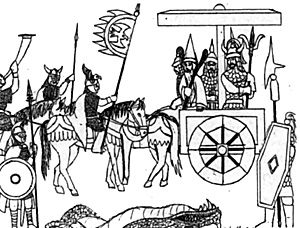
This is the article that I should have written before any of the other solo RPG articles I’ve written for Lone Warrior. Oh well, live and learn. If my previous articles have piqued your curiosity about solo RPG play, paying attention to this article before deciding to take the plunge will hopefully save you some unnecessary grief.
For whatever reason, you have decided to play your own solitaire role-playing game. You are taking a scary but exciting step into the unknown. I know, I've been there. Maybe you are tired of playing with the munchkins down the street, who laugh at your bard as their fighters and spellslingers slaughter the orcs that you want to parlay with. Maybe you have some grand epic ideas for a story and know that the other people you have to play with will turn it into a monty haul, “kill everything in sight” game that just doesn’t do your story justice.
Maybe you really like science fiction and don’t want to play a fantasy game, which is all anybody in your town plays. Maybe you're a game master who has a great idea for a scenario but aren't sure whether it's too tough or not and want to "try it out" yourself before unleashing it on your players. For whatever reason, you want to play a solitaire role-playing game. Before you start in this endeavor, however, you need to put some thought into the rules set that you will use.
But how do you know which rules set to pick? The answer to this question may be very easy, or it may be very difficult. If you're just testing out an adventure for a group you already run games for, then you should know which system you're going to be using. Or maybe you've just got an old copy of Runequest lying around and you don’t want to get anything new. That's fine. However, if you're starting with an idea, rather than a rules set, you have a significant choice to make. There are literally hundreds of role-playing game systems that have been written and published over the years. There are traditional fantasy games, science fiction games, horror games, old west games, multi-genre combination games, humor games; you name it, somebody has probably written it at some point.
Let's say that you walk into a game store with the intent of buying a role-playing game for the purpose of playing solitaire games. You head to the RPG section and see dozens of games. How are you supposed to know which one to buy? To some degree, it's simply a matter of personal taste, but I want to introduce you to some guidelines you can use in making your decision.
The first guideline is blindingly obvious, but I'll state it anyway. If you know what genre you want to play, pick a game in that genre. If you know you want to play a game with giant robots like in a Japanese TV show, make sure you get a game that lets you do that. Don't pick Dungeons & Dragons, because that won't have giant robots. As I said, it's obvious, but somebody would've screwed it up if I didn't say it.
Second, there are some games that don't play well solitaire. You will probably have the best experience with a game system that allows for a significant of randomization. This is to add the element of the unknown to your game. If you have plotted out everything that's going to happen, you eliminate part of the fun that comes from experiencing the unfolding of the game’s story. If you just want to write a story, then go ahead and do that. It won’t be a game, however.
Some game systems will force you to always interpret character actions yourself, and it won’t end up feeling like a game at all. Let's take the admittedly extreme case of Amber. Amber is a diceless gaming system. I am not sure how this even works, having never played it myself, but my understanding is that players tell the gamemaster what they want their characters to do, and then the gamemaster interprets their actions according to the rules. In a solo game this would be immensely boring, as you would know the result of every action before your character(s) tried it. Does Sir Reginald successfully leap across the chasm to retrieve the Sacred Ankh of Polarity? Well, of course he does. I mean, why would you have him plummet to his death? There’s no actual risk to the character, so any drama is lost. Compare this with Rolemaster, which is infamous for its incredible array of random tables. Not that you want to randomize everything, or even most things, but having the option can come in handy from time to time.
 Third, you should consider the level of support that the game’s publisher is likely to give to the product. “Support,” in this case, refers to sourcebooks that further expand the game world and provide optional rules, new equipment, etc.; pre-designed adventures that allow you to play the game without designing your own adventures on the fly; magazines (either paper-based or on the Internet); and other things like that. The king of game support is Dungeons & Dragons, as there is a vast array of stuff that has been written for the game, and this doesn’t even include what is available under the D20 license. However, other games have a strong degree of product support, such as Vampire: the Masquerade, Legend of the Five Rings, and Shadowrun, to name a few.
Third, you should consider the level of support that the game’s publisher is likely to give to the product. “Support,” in this case, refers to sourcebooks that further expand the game world and provide optional rules, new equipment, etc.; pre-designed adventures that allow you to play the game without designing your own adventures on the fly; magazines (either paper-based or on the Internet); and other things like that. The king of game support is Dungeons & Dragons, as there is a vast array of stuff that has been written for the game, and this doesn’t even include what is available under the D20 license. However, other games have a strong degree of product support, such as Vampire: the Masquerade, Legend of the Five Rings, and Shadowrun, to name a few.
Support is important because it allows you to expand your games without making stuff up on your own. If you’re like me and don’t have infinite time to spend developing things for your games, a good sourcebook or magazine article can prove immensely beneficial. It’s really a matter of personal taste, though. Some people really like inventing their own stuff, and may face solitaire role-playing as a way to fuel their creativity and invent their own worlds and stories from whole cloth. In this case, you will probably just want to find a rules set that you like that isn’t attached to a pre-ordained setting (or one that is easily divorced from its setting). This is more easily said than done, but you can do it with “universal” rules sets like GURPS.
I do want to make one observation at this time about the D20 system. The latest edition of Dungeons & Dragons has a core rules set that has been designated the D20 system. This rules set has been released under the Open Gaming License. This allows any publisher to publish stuff that is fully compatible with Dungeons & Dragons without licensing the property. This has caused a LOT of stuff to get published, which may be a big draw if you don’t want to do a lot of design work on your own. However, I would like to remind you of Sturgeon’s Law, which is that “90% of everything is crud.” Yes, there is some really great stuff published under the D20 license, but there’s also some lousy stuff out there. This happens with any gaming system, but especially when you have people that didn’t design the main game publishing stuff on their own, some of which doesn’t even follow the rules properly. “Caveat emptor.”
The fourth, and last, guideline is another one that should be obvious but may not be: solitaire role-playing really isn’t anything like standard role-playing with a group of people. No great surprise here, as you’re not just a player or a game master; you’re both. It’s individual storytelling with rules to provide a framework for conflict resolution. If you’re playing a combat-heavy game, say one where the characters are in a military unit, then your games may end up feeling like character-based wargame scenarios with maybe some plot in-between to tie the encounters together. There’s nothing wrong with this.
In fact, I once played a Robotech campaign for over a year that was just like this, and I had a lot of fun with it. Also, adventures that deal with mysteries (who poisoned the countess?) or solving riddles can be difficult to pull off unless you’re using a published adventure that you didn’t design and aren’t familiar with. Having the secret plans for the new enemy submarine hidden behind a logic puzzle you designed yourself is pretty useless in a solo RPG game. If someone else designed the logic puzzle, though, it might work.
To sum up, the game system that you choose to play with can have a lot of effect on how you play your games. Know the genre you want and pick a game in that genre. Choose a system that gives you the maximum amount of freedom to tell your story. The level of anticipated support for the game may be an important thing to consider. Above all, have fun. It will probably take some experimentation to find a system that works well for you, but the end result is worth the investment.
Back to Table of Contents -- Lone Warrior #140
Back to Lone Warrior List of Issues
Back to MagWeb Magazine List
© Copyright 2002 by Solo Wargamers Association.
This article appears in MagWeb (Magazine Web) on the Internet World Wide Web.
Other military history articles and gaming articles are available at http://www.magweb.com
